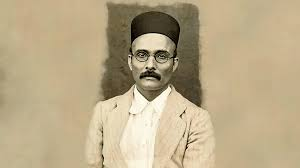Important Facts For Prelims
Veer Savarkar Jayanti
- 29 May 2025
- 3 min read
Why in News?
On 28th May, the Prime Minister paid tribute to Vinayak Damodar Savarkar (Veer Savarkar) on his birth anniversary.
Who was Vinayak Damodar Savarkar and What were his Major Contributions?
- Early Life:
- Born on 28th May, 1883, in Nashik, Maharashtra, VD Savarkar (also known as Swatantryaveer Savarkar) was a freedom fighter, politician, lawyer, writer, and social reformer.
- Related Organisations and Work:
- Founded Mitra Mela in 1899, later, it was renamed as the Abhinav Bharat Society in 1904.
- Established Free India Society in London in 1906 to foster revolutionary nationalism among Indian students abroad. Played a key role in the India House in London (founded by Shyamji Krishna Verma), a hub for revolutionary activities.
- Advocated guerrilla warfare, allegedly involved in making handmade bombs, and provided legal aid to Madan Lal Dhingra.
- Authored the influential book "Hindutva: Who is a Hindu?" (1923) and also wrote "The History of the First War of Indian Independence".
- Savarkar sometimes wrote using the pen-name "Mahratta" for some of his writings.
- Trial & Sentence:
- He was arrested in 1909 on charges of plotting armed revolt against the Morley-Minto reform (Indian Councils Act 1909), later extradited and sentenced to life imprisonment and deported to the Cellular Jail in the Andaman and Nicobar Islands (also known as Kala Pani).
- He was later interned at Ratnagiri until 1937.
- He attempted to escape while being transported via Marseilles but was recaptured by British authorities.
- He was arrested in 1909 on charges of plotting armed revolt against the Morley-Minto reform (Indian Councils Act 1909), later extradited and sentenced to life imprisonment and deported to the Cellular Jail in the Andaman and Nicobar Islands (also known as Kala Pani).
- Political Career and Ideology:
- After his release, Savarkar served as President of the Hindu Mahasabha (1937–1943) and opposed the Quit India Movement (1942), considering it impractical.
- He engaged in discussions on the Cripps Mission and Wavell Plan, promoting national unity.
- Influenced by Tilak, Lajpat Rai, and Bipin Chandra Pal, Savarkar envisioned a unified nation with equal rights for all, rooted in loyalty to India.
- A strong advocate of civil liberties and social reform, he fought against casteism, promoted inter-caste marriages, Dalit temple entry (e.g., Patit-Pavan Mandir), sea-crossing, and reconversion to Hinduism.
- Death & Legacy:
- In 1964, feeling that his mission was complete after India’s independence, Savarkar began a hunger strike on 1st February and died on 26th February 1966.
- In recognition of his contributions, Port Blair Airport in the Andaman and Nicobar Islands was renamed Veer Savarkar International Airport in 2002.
| Read More: Veer Savarkar Jayanti |







